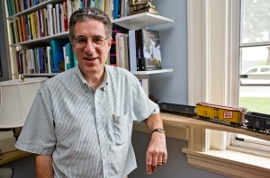The Science Behind Morality
By Gail Bambrick
An upcoming symposium examines the intersection of cognitive science and public policy

Ray Jackendoff hopes to “break down the walls between academics and real-world practitioners to create new kinds of thinking with pragmatic implications.” Photo: Alonso Nichols
Our sense of morality is as strongly rooted as it is complicated and sometimes contradictory. Consider murder, for example. Killing another person is widely considered immoral, yet during wartime it is celebrated with medals. How—and why—do we learn morality in the first place, and apply it through judgments and in society?
Sorting out these and other questions will be the core challenge of a symposium being hosted at Tufts University in mid-October, as participants aim to understand the cognitive aspects of morality, and how it intersects with policymaking.
“Cognitive scientists have given little thought to public policy, and policymakers are mostly unaware there is a cognitive science of morality,” says Ray Jackendoff, the Seth Merrin Professor of Philosophy and co-director of Tufts’ Center for Cognitive Studies.
The symposium, “Morality and the Mind: Cognitive Science and Policy,” takes place October 16 and 17 in the ASEAN Auditorium at the Cabot Center. The event is being organized by Jackendoff in collaboration with Sherman Teichman, director of Tufts’ Institute for Global Leadership.
Jackendoff says he hopes the symposium will start to “break down the walls between academics and real-world practitioners to create new kinds of thinking with pragmatic implications.”
Among the participants will be a primatologist talking about the building blocks of human social systems; an economist discussing how moral judgments can be transformed into economic judgments within the legal system; and a former national security advisor exploring how to take account of another culture’s morality in diplomatic relations and negotiations.
Jackendoff’s work in linguistics motivates his interest in these issues. He suggests that approaches to the study of language can be adapted to studying issues of culture, like morality. In language, he says, “we have learned that there is a body of unconscious knowledge that makes speaking and understanding totally transparent.”
But “there’s little attention paid to the question of what is it about humans that makes them able to engage in culture,” he says. How we learn the culture that surrounds us as we grow up mirrors the way we acquire language, he says.
As children, for example, we learn to associate objects with sounds. An adult says the word “dog” while pointing at a poodle, and a normal child quickly learns the concept. But it turns out there’s a far more complicated cognitive process at work than many of us suppose, Jackendoff says. And the process is even more mysterious when it comes to learning abstract concepts like ought to, or shouldn’t—what is right or what is wrong.
“Much of culture might be consciously taught—you don’t do this, you don’t marry these people, this is what you should wear—but this is not the way language is usually acquired,” Jackendoff says. “Still, if you try to explain why there is such a thing as morality at all, and how children grasp it, the learning process turns out to be fantastically complicated and not entirely conscious.”
There are deeper parallels between linguistic and moral judgments. Symposium participant John Mikhail, a professor of law at Georgetown University, will build on well-known legal philosopher John Rawls’s proposal that moral judgments are much like linguistic judgments—they come to mind intuitively and you can give reasons for them, but your reasons are not the same as the judgment itself.
“Examining the logical structure behind moral judgments, asking what good it does you or the society for there to be such a thing as morality and exploring the evolutionary roots of morality can help us understand why moral conflicts arise,” says Jackendoff.
But this doesn’t necessarily tell us how to solve such conflicts in real life. Jackendoff says he and Teichman think of the symposium as an experiment in confronting the emerging results from cognitive science with real-world issues in diplomacy, legal practice, security and economics. Their goal, he says, “is to facilitate a lively interchange of ideas, in the hope of building bridges between the very different worlds of cognitive science and policy.”
“The Morality and the Mind: Cognitive Science and Policy” symposium is free and open to the public. For more information, visit http://www.tuftsgloballeadership.org/programs/special/morality-and-mind.
Gail Bambrick can be reached at gail.bambrick@tufts.edu.
